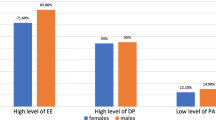Abstract
This paper presents the results of a comparative study of the clinical symptoms of emotional burnout syndrome among 84 elderly women working in the specialty of physicians and 48 women who have officially ceased working in this specialty. The findings suggest that emotional burnout syndrome can take place in the elderly and is most closely associated with continued professional activity. The cessation of this working activity leads to stress, often with the subsequent development of posttraumatic stress disorder and stressinduced diseases. However, in this case, the clinical symptoms of emotional burnout syndrome do not disappear but are only transformed with joining of various psychosomatic disorders. Thus, the elderly who suffer from emotional burnout syndrome are a risk group as regards the formation and development of stress-associated diseases and require close attendance within the compulsory program of medical examination.
Similar content being viewed by others
References
Amirov, N.Kh., Berkheeva, Z.M., Garipova, R.V., et al., Professional activity as the basis of occupational pathology in health workers, Kazan. Med. Zh., 2004, vol. 85, no. 4, pp. 305–307.
Berdyaeva, I.A. and Voit, L.N., Syndrome of emotional burnout in doctors of various specialties, Dal’nevost. Med. Zh., 2012, no. 2, pp. 117–120.
Boiko, V.V., Energiya emotsii v obshchenii: vzglyad na sebya i na drugikh (The Energy of Emotions in Communication: A View of Oneself and Others), Moscow: Filin”, 1996.
Vodop’yanova, N.E. and Starchenkova, E.S., Sindrom vygoraniya: diagnostika i profilaktika (Burnout Syndrome: Diagnosis and Prevention), St. Petersburg: Piter, 2008, 2nd ed.
Groza, I.V., Influence of the teacher’s age and experience on emotional burnout, Sovrem. Naukoemkie Tekhnol., 2009, no. 10, pp. 63–64.
Kotenev, I.O., Oprosnik travmaticheskogo stressa dlya diagnostiki psikhologicheskikh posledstvii neseniya sluzhby sotrudnikami vnutrennikh del (A Questionnaire of Traumatic Stress for Diagnostics of Psychological Consequences for Employees of Internal Affairs after Service), Moscow: Minist. Vnutr. Del, 1996.
Myakotnykh, V.S. and Torgashov, M.N., Stress-indutsirovannye rasstroistva (Stress-Induced Disorders), St. Petersburg: Mobi Dik, 2015.
Torgashov, M.N. and Myakotnykh, V.S., Some pathogenetic mechanisms of development of stress-induced pathology, Vestn. Ural. Med. Akad. Nauk, 2016, no. 2, pp. 64–74.
Torgashov, M.N., Myakotnykh, V.S., and Borovkova, T.A., Clinico-pathogenetic relationships of different variants of stress-induced states and accelerated aging in war veterans, Vestn. Ural. Med. Akad. Nauk, 2016, no. 1, pp. 86–90.
Chutko, L.S. and Kozina, N.V., Sindrom emotsional’nogo vygoraniya: klinicheskie i psikhologicheskie aspekty (Emotional Burnout Syndrome: Clinical and Psychological), Moscow: MEDpress-inform, 2014, 2nd ed.
Chen, K.Y., Yang, C.M., Lien, C.H., et al., Burnout, job satisfaction, and medical malpractice among physicians, Int. J. Med. Sci., 2013, vol. 10, no. 11, pp. 1471–1478.
Fontana, D., Managing Stress, London: BPS Books, 1989.
Freudenberger, H.J., Staff burn-out, J. Soc. Issues, 1974, vol. 30, no. 1, pp. 159–165.
Lesage, F.X., Berjot, S., Altintas, E., and Paty, B., Burnout among occupational physicians: a threat to occupational health systems?—a nationwide cross-sectional survey, Ann. Occup. Hyg., 2013, vol. 57, no. 7, pp. 913–919.
Maslach, C. and Jackson, S.E., Burnout Inventory (MBI): Manual, Palo Alto: Consulting Psychologists, 1986.
Maslach, C. and Jackson, S.E., The measurement of experienced burnout, J. Occup. Behav., 1981, vol. 2, pp. 99–113.
Author information
Authors and Affiliations
Corresponding author
Additional information
Original Russian Text © V.S. Myakotnykh, T.A. Borovkova, 2017, published in Uspekhi Gerontologii, 2017, Vol. 30, No. 2, pp. 208–214.
Rights and permissions
About this article
Cite this article
Myakotnykh, V.S., Borovkova, T.A. Emotional burnout syndrome in elderly women–physicians. Adv Gerontol 7, 208–213 (2017). https://doi.org/10.1134/S2079057017030109
Published:
Issue Date:
DOI: https://doi.org/10.1134/S2079057017030109



